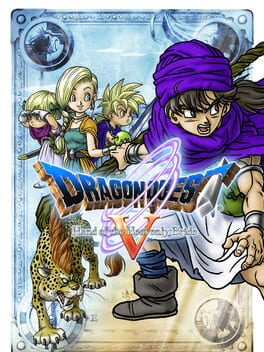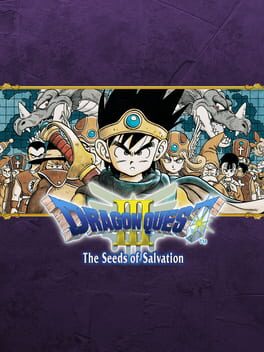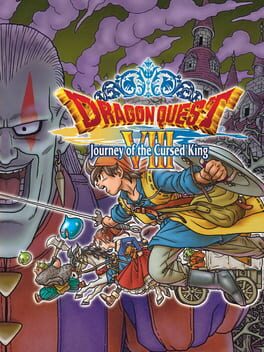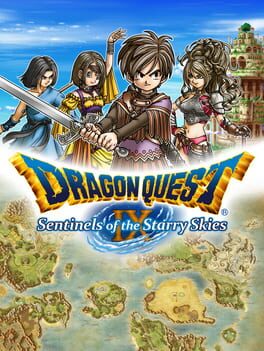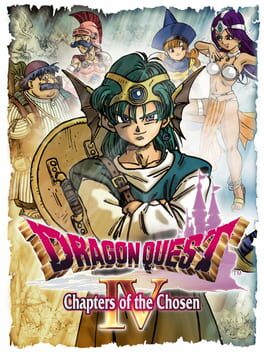ElMeGaMer
Recent Activity
hexerii
reviewed
Flower, Sun, and Rain
It’s always refreshing to play a game that goes beyond just wanting you to feel simple excitement and enjoyment through its mechanics, even more so when it's a game that revels in its antithetical game design like Flower, Sun, and Rain (2001) does, a game able to seamlessly integrate said gameplay with the themes it covers, as well as the broader strokes of its predecessor The Silver Case (1999). Immensely dense for its relatively short run-time and filled to the brim with double and triple meanings, Flower, Sun, and Rain delivers on an unforgettable, perplexing experience, weaving a web of countless possible narrative and thematic interpretations centred around a man clinging to the eternally recurring present he's eased into, until he finds himself completely enveloped by it. This web that is spun is expansive, and just as alluring as the paradise of Lospass Island. Whether you view it as a deconstruction and satire of video games, a commentary on the nature of paradise, or through any other lens, no interpretation is less valid than the next, and no truth is singular. Let yourself be swept away by the vibrant palette of colours at every turn, as...
“...Lospass island is the finest resort on earth where you can forget about time.”
One of the most potent feelings imparted onto me by The Silver Case was this sense of being boxed in. Confinement brought around by restricted and clunky grid-based movement, coupled with the cramped user interfaces consisting entirely of clicking and clacking boxes, all of these elements serving as our conduit to the drab and sanitised 24th Ward, which might as well be just as constricted and controlling. As such, the first step taken on Lospass Island marks a monumental shift in tone, alleviating the suffocating atmosphere that permeated every corner of the 24th Ward, and transporting us away to a place best described as paradise; greeted with the pleasant sights and sounds of a tropical island, protagonist Sumio Mondo sets forth to hotel “Flower, Sun, and Rain”. Controlling Sumio is far less restrictive than Akira, with the game opting to transition away from both the rigid first-person camera and grid movement, towards a third-person camera and full three-dimensional movement which works in conjunction with the interconnected layout of Lospass to deliver a fitting impression of freedom. Considering the presentation, tone and gameplay, it wouldn’t be fallacious to say Flower, Sun, and Rain positions itself, at least on the surface, as an almost polar opposite to The Silver Case.
This contrast between the two begins to lose its credibility the longer time goes on however, as the idea of “paradise” that Lospass so adamantly parades around quickly finds itself no more than a thinly veneered facade. Once you break it down, Lospass is actually quite barren, apart from the hotel we have a diner, a lighthouse… and a shopping centre. All of the island’s landmarks stand not as a collective, but in isolation, creating an overall sense of incongruity, and reinforcing the already unnaturalistic atmosphere these buildings emanate due to the clash of traditional and modern architecture between them. With so little to see and do, guests can be found residing themselves to only the hotel. But by limiting yourself to just the hotel, or relying on a guidebook as a plan for things to do, that's nothing more than obediently following a pre-planned script carefully curated to appease and excite made by the hotel company themselves. We, and by extension the guests, are party to the artificial nature of Lospass as much as it is to itself. Nothing on Lospass is coherent, even its inhabitants are often deeply unhappy, requiring our assistance despite being in "paradise", or down-right deceitful, wearing plastic smiles while trying to misdirect us. Everything is real yet nothing is real, an island without any semblance of identity, and if it previously had one, it's evidently been gone for years.
And yet, is it really that strange to lose yourself in? One of the shared themes across the Kill The Past games I’ve played is that of the truth, specifically the denouncement of dogmatic truths. Truth is always tinted, its meaning born from the minds of each individual person, and as such, there is no singular truth to paradise. In game, one character states, “There’s no such thing as a real paradise” to which another character counters, “A paradise is a place separate from the world” with the first person responding again, “Not very convincing. You can’t do better than that?”. To me, Flower, Sun, and Rain isn’t so much infatuated with the idea of defining paradise as it is with discerning why people seek it out, and its implications - the game recognises the futility of trying to truly define paradise as shown by the conversation above, people are bound to have vastly opposing beliefs. My reading into Flower, Sun, and Rain is that the beauty we ascribe to paradise is exclusively on the outside, designed to mask the hollowness within, it’s a temporary state of mind: an escape. People see what they want to see in it, creating their own paradise away from reality and willingly glossing over the negatives and harmful nature of many vacation destinations, such the artificiality of Lospass. Sooner or later, you need to confront what you’re running from, or the sweet aroma of paradise will ensnare you forever - kill the past.
Perhaps my favourite lens through which to view the game from is the deconstructive and satirical side. Sumio is not just a fascinating character for his arc throughout the game, but also due to the player character link that is established. The connection between him and Catherine resembles that of a player and their computer, with the Lospass guidebook akin to a gaming manual. Interpreting Sumio, Catherine and the guidebook like this is the same as likening Flower, Sun, and Rains scenario to a video game with Sumio at the forefront as the player. This is not that far from the reality of it, as the line between the video game Flower, Sun and Rain and the in-game universe of Flower, Sun, and Rain is constantly blurred, to the point there is almost no tangible difference. We and Sumio share the same goal, and it’s constantly interrupted by convenient obstacles at every turn. Objects or people who could easily be sidestepped or simply ignored in real life cannot be passed, certain nonsensical flags have to be met before progression can be made, and the game takes such wonderful delight in making us aware of all these facts, constantly. It’s normal to think there exists some higher power deliberately acting to mess with you, and I can assure you Sumio feels the same way.
But for me, this is just another element of what makes the experience so great. Rather than frustration being born from the everyday impediments that stood in my way, it turned into this feeling of eager anticipation at which video game trope will be put in the crosshairs instead, with the writing of its satire always witty, balanced enough in tone that these moments don’t clash with the more serious story strokes. So many elements of the game are there to evoke pushback from the player, the tedious amounts of walking or the grating amounts of backtracking come to mind, but for all the irritation they cause, they are instrumental in defining and shaping other elements of the game, such as the puzzles. Despite their simplicity, the act of solving the puzzles is so gratifying, too gratifying in fact for how rudimental they can be, but it's precisely because of those aforementioned long walks and the rigid daily rhythm we and Sumio find ourselves in that we capitalise on any form of stimulation we can get our hands on. By adding frequent fast travel or a sprint button, you may have a more bearable game at times, but the rewarding feeling you get from the puzzles and dialogue that are interspersed between these tedious moments would lose its power, causing the games carefully curated balance between the two to crumble. In the same way a flower is able to bloom with both sun and rain, Flower, Sun, and Rain is a video game able to thrive thanks to both its simultaneously hostile and fulfilling game design, the juxtaposition of the two ultimately giving form and meaning to the other.
Such an enigma of a game, one I still don’t feel fully confident talking about, nor do I think a review can truly capture its surreal nature without experiencing it first hand, but nonetheless Flower, Sun, and Rain is a game I just so desperately wanted to talk about anyway. Really beautiful experience that to me didn’t have apparent value right away beyond its humour, but progressively I was more and more taken aback by how entertaining and thought-provoking it became. In many ways taught me more about why I like video games, and how to approach certain aspects of them, simply just a one-of-a-kind game everyone should try, of course after The Silver Case that is!!! Also has one of the best openings I’ve ever seen.
“...Lospass island is the finest resort on earth where you can forget about time.”
One of the most potent feelings imparted onto me by The Silver Case was this sense of being boxed in. Confinement brought around by restricted and clunky grid-based movement, coupled with the cramped user interfaces consisting entirely of clicking and clacking boxes, all of these elements serving as our conduit to the drab and sanitised 24th Ward, which might as well be just as constricted and controlling. As such, the first step taken on Lospass Island marks a monumental shift in tone, alleviating the suffocating atmosphere that permeated every corner of the 24th Ward, and transporting us away to a place best described as paradise; greeted with the pleasant sights and sounds of a tropical island, protagonist Sumio Mondo sets forth to hotel “Flower, Sun, and Rain”. Controlling Sumio is far less restrictive than Akira, with the game opting to transition away from both the rigid first-person camera and grid movement, towards a third-person camera and full three-dimensional movement which works in conjunction with the interconnected layout of Lospass to deliver a fitting impression of freedom. Considering the presentation, tone and gameplay, it wouldn’t be fallacious to say Flower, Sun, and Rain positions itself, at least on the surface, as an almost polar opposite to The Silver Case.
This contrast between the two begins to lose its credibility the longer time goes on however, as the idea of “paradise” that Lospass so adamantly parades around quickly finds itself no more than a thinly veneered facade. Once you break it down, Lospass is actually quite barren, apart from the hotel we have a diner, a lighthouse… and a shopping centre. All of the island’s landmarks stand not as a collective, but in isolation, creating an overall sense of incongruity, and reinforcing the already unnaturalistic atmosphere these buildings emanate due to the clash of traditional and modern architecture between them. With so little to see and do, guests can be found residing themselves to only the hotel. But by limiting yourself to just the hotel, or relying on a guidebook as a plan for things to do, that's nothing more than obediently following a pre-planned script carefully curated to appease and excite made by the hotel company themselves. We, and by extension the guests, are party to the artificial nature of Lospass as much as it is to itself. Nothing on Lospass is coherent, even its inhabitants are often deeply unhappy, requiring our assistance despite being in "paradise", or down-right deceitful, wearing plastic smiles while trying to misdirect us. Everything is real yet nothing is real, an island without any semblance of identity, and if it previously had one, it's evidently been gone for years.
And yet, is it really that strange to lose yourself in? One of the shared themes across the Kill The Past games I’ve played is that of the truth, specifically the denouncement of dogmatic truths. Truth is always tinted, its meaning born from the minds of each individual person, and as such, there is no singular truth to paradise. In game, one character states, “There’s no such thing as a real paradise” to which another character counters, “A paradise is a place separate from the world” with the first person responding again, “Not very convincing. You can’t do better than that?”. To me, Flower, Sun, and Rain isn’t so much infatuated with the idea of defining paradise as it is with discerning why people seek it out, and its implications - the game recognises the futility of trying to truly define paradise as shown by the conversation above, people are bound to have vastly opposing beliefs. My reading into Flower, Sun, and Rain is that the beauty we ascribe to paradise is exclusively on the outside, designed to mask the hollowness within, it’s a temporary state of mind: an escape. People see what they want to see in it, creating their own paradise away from reality and willingly glossing over the negatives and harmful nature of many vacation destinations, such the artificiality of Lospass. Sooner or later, you need to confront what you’re running from, or the sweet aroma of paradise will ensnare you forever - kill the past.
Perhaps my favourite lens through which to view the game from is the deconstructive and satirical side. Sumio is not just a fascinating character for his arc throughout the game, but also due to the player character link that is established. The connection between him and Catherine resembles that of a player and their computer, with the Lospass guidebook akin to a gaming manual. Interpreting Sumio, Catherine and the guidebook like this is the same as likening Flower, Sun, and Rains scenario to a video game with Sumio at the forefront as the player. This is not that far from the reality of it, as the line between the video game Flower, Sun and Rain and the in-game universe of Flower, Sun, and Rain is constantly blurred, to the point there is almost no tangible difference. We and Sumio share the same goal, and it’s constantly interrupted by convenient obstacles at every turn. Objects or people who could easily be sidestepped or simply ignored in real life cannot be passed, certain nonsensical flags have to be met before progression can be made, and the game takes such wonderful delight in making us aware of all these facts, constantly. It’s normal to think there exists some higher power deliberately acting to mess with you, and I can assure you Sumio feels the same way.
But for me, this is just another element of what makes the experience so great. Rather than frustration being born from the everyday impediments that stood in my way, it turned into this feeling of eager anticipation at which video game trope will be put in the crosshairs instead, with the writing of its satire always witty, balanced enough in tone that these moments don’t clash with the more serious story strokes. So many elements of the game are there to evoke pushback from the player, the tedious amounts of walking or the grating amounts of backtracking come to mind, but for all the irritation they cause, they are instrumental in defining and shaping other elements of the game, such as the puzzles. Despite their simplicity, the act of solving the puzzles is so gratifying, too gratifying in fact for how rudimental they can be, but it's precisely because of those aforementioned long walks and the rigid daily rhythm we and Sumio find ourselves in that we capitalise on any form of stimulation we can get our hands on. By adding frequent fast travel or a sprint button, you may have a more bearable game at times, but the rewarding feeling you get from the puzzles and dialogue that are interspersed between these tedious moments would lose its power, causing the games carefully curated balance between the two to crumble. In the same way a flower is able to bloom with both sun and rain, Flower, Sun, and Rain is a video game able to thrive thanks to both its simultaneously hostile and fulfilling game design, the juxtaposition of the two ultimately giving form and meaning to the other.
Such an enigma of a game, one I still don’t feel fully confident talking about, nor do I think a review can truly capture its surreal nature without experiencing it first hand, but nonetheless Flower, Sun, and Rain is a game I just so desperately wanted to talk about anyway. Really beautiful experience that to me didn’t have apparent value right away beyond its humour, but progressively I was more and more taken aback by how entertaining and thought-provoking it became. In many ways taught me more about why I like video games, and how to approach certain aspects of them, simply just a one-of-a-kind game everyone should try, of course after The Silver Case that is!!! Also has one of the best openings I’ve ever seen.
1 day ago
Paenitentia
finished
Mega Man Xtreme 2
1 day ago
Paenitentia
completed
Mega Man Xtreme 2
1 day ago
1 day ago
1 day ago
1 day ago
1 day ago
1 day ago
1 day ago
Paenitentia
finished
Mega Man Xtreme
2 days ago
Paenitentia
completed
Mega Man Xtreme
2 days ago
2 days ago
Paenitentia
finished
Castlevania: Bloodlines
2 days ago
Paenitentia
completed
Castlevania: Bloodlines
2 days ago

